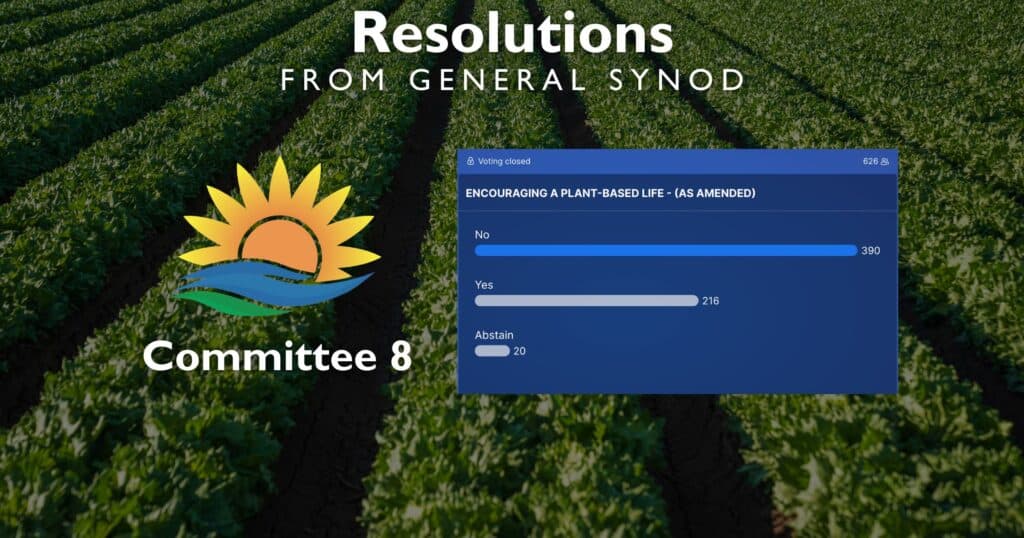Delegates reject resolution on plant-based living
The proposed resolution “Encouraging a Plant-Based Life” was rejected by delegates to the 34th General Synod, with several speakers saying the United Church of Christ should not “shame” people for what they eat.
The resolution faced a tough road from the start. Many passionate speakers came to its committee hearing on Sunday, July 2 to raise concerns that it was attacking people from cultures who center celebrations around meat, would be harmful to community farmers who show great care for their animals and was tone-deaf to those who live in marginalized communities who do not have access to fresh fruit and vegetables or cannot afford meat alternatives.
In response to those concerns, a small group from the committee spent several hours recrafting the six “Therefore” pieces of the resolution — the only part of resolutions that committees are invited to edit. The new language focused on increasing the use of plant-based items, rather than reducing animal consumption; called for educational resources around health, sustainability, food apartheid, the ethical treatment of animals and fair and safe agricultural practices; and focused on addressing factory farming rather than calling on all animal farmers to transition to planting crops.
Addressing concerns
Some committee members believed they had revised the resolution enough to gain the support of those who had initially opposed it.
“I think it was amazing what we created, and that the concerns that were raised in the room were addressed,” said the Rev. Paul Doyle, a committee member and pastor from Park Church in Norwich, Conn.
Doyle said early on that he thought the committee would have to either vote the resolution down or recommend no action, so he found it “wonderfully amazing” that they were able to come together on something they could recommend to the full body. He said members of the committee who shared a meal together after their initial meeting committed to praying for those doing the rewriting. In the end, two of the resolution’s original authors said they appreciated and approved of the changes made.
Committee chair the Rev. Hank Fairman, senior pastor of St. John UCC in Freeport, Ill., outlined the work the committee had done when presenting the resolution in plenary Tuesday, July 4.
Each strike-through and deletion, he said, “was discerned with a heart toward loving neighbor, a passion for the call for peace and justice between humanity and God’s creation. This is what we do when we embrace the challenge to be the church, to love our children, to love our neighbors and to love creation.”
Hopes for a ‘clearer resolution’
The Rev. Holly Morrison, pastor of Phippsburg Congregational Church in Maine, commended the work of the committee, but pointed out the parts of the resolution they could not change — the “Whereas” statements — were “still full of statements untrue and harmful.”
“I speak for the soil. Where I live, the topsoil replenishes at the rate of one inch every 100 years,” she said. “Each teaspoon of soil holds literally millions of blessed lives on whom our lives depend. When you till the soil for annual crops — grain, soy and, yes, kale — you destroy these lives and many others. Livestock are essential and irreplaceable partners in the work of healing and restoring soil.”
Another delegate said the original resolution and the changes were “two vastly different things” — one calling for a plant-based life, and one calling for plant-based alternatives to be offered. While he said he supported either of those things, he urged a no vote so that a clearer resolution could be put forth in the future.
Amendments attempted
Two amendments to the resolution were proposed from the floor — one was accepted, the other turned down. But in the end, delegates voted 392 to 280 against passage.
“If the resolution were primarily encouraging the Church to respond to big agriculture, I’d be supporting it,” said Jabe Ziino of the Old First Reformed Church in Brooklyn, N.Y. “However, the resolution centers on the food choices of individuals and passes moral judgments on those choices, and I cannot support it.”
He went on, “This resolution encourages us to shame the food choices of some people while entrenching and privileging one particular cultural perspective on food.”
Tiffany Vail, a General Synod newsroom volunteer, is the director of media and communications for the Southern New England Conference.
Content on ucc.org is copyrighted by the National Setting of the United Church of Christ and may be only shared according to the guidelines outlined here.
Related News
2025 Climate Hope Art Contest award winners plant seeds of hope
The celebration of the 2025 Climate Hope Art Contest for children and youth of the United...
Read More‘Not your typical webinar’: Womxn 2 Womxn series aims to foster community
As the church works towards gathering this summer at General Synod 35 in Kansas City,...
Read MoreThompson to bring a ‘prophetic and pastoral’ message to Synod: ‘We are not all the same, but still one body’
On Sunday, July 13, the Rev. Dr. Karen Georgia Thompson will take the stage at the 35th...
Read More



